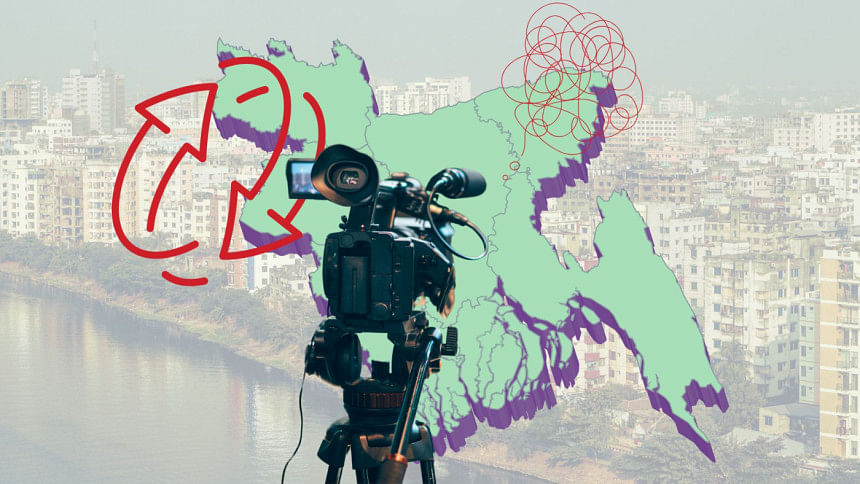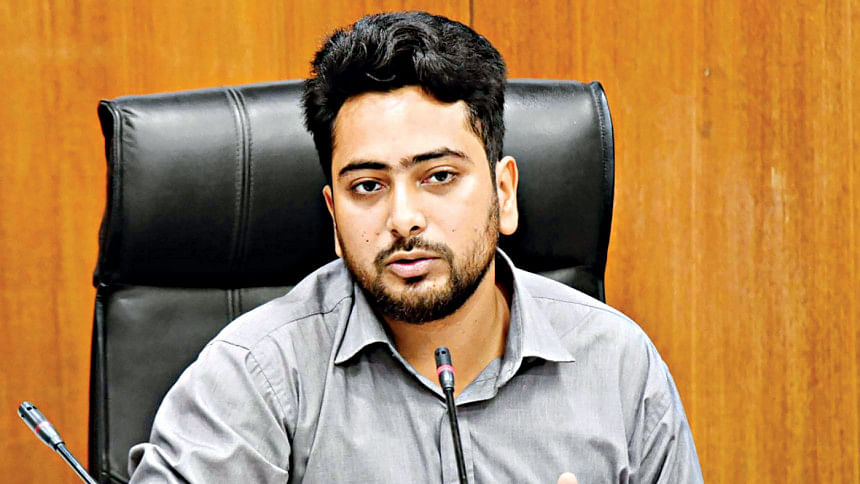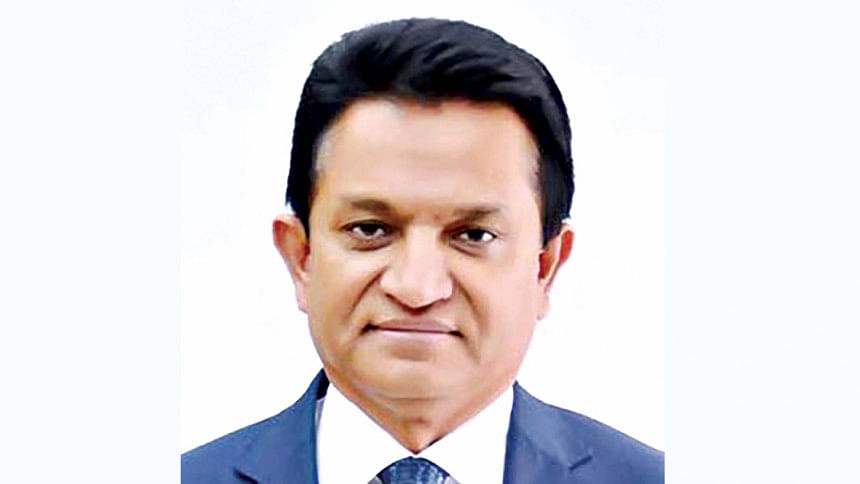Allegiance shifts, so do faces at the helm

Bangladesh's media industry has seen some major shake-ups, with more than two dozen outlets shuffling leadership positions following the July mass uprising last year.
Editors in at least eight newspapers and heads of news in 11 private television channels have been either dismissed or "forced to resign", while some left their jobs.
Key positions such as executive editor, chief news editor, and news editor in around a dozen houses also saw changes.
These positions have been largely filled by individuals affiliated with BNP and Jamaat-leaning journalist associations, leaders of various other journalist associations, or reporters who covered BNP and Jamaat beats for a considerable period.
Mostly, media owners who had strong ties to the now-deposed Awami League government made those changes in the aftermath of August 5.
The Daily Star has learned this after speaking with over 30 journalists, including some who have lost their jobs. They, however, would not comment on the record for fear of reprisal.
Many of the dismissed senior journalists, accused of having ties to the previous regime or benefiting from its patronage, are facing lawsuits over killings during the student-led mass uprising that ousted the Sheikh Hasina government. They are now living in seclusion.
The authorities concerned are also investigating their bank accounts.
Contacted, Information Adviser Nahid Islam yesterday said the interim government neither helped anyone nor intervened in changing the ownership or leadership in any privately owned media houses.
The interim government neither helped anyone nor intervened in changing the ownership or leadership in any privately owned media houses.

"The government only brought changes in the state-run news organisations following due procedure," he told The Daily Star.
Private news organisations might have changed their leadership on their own, he added.
The media reform commission, which is looking into these issues, and the government will act, if necessary, and if the commission gives any proposal in this regard, he said.
Besides, the government did not receive any allegations from any media, he said adding they will take steps if they receive any allegations regarding violations of relevant laws.
DIVISION AMONG JOURNALISTS
The realignments reflect the shifting allegiances of many media organisations in a country where journalism and politics have long been intertwined.
A significant segment of the journalist community here is starkly divided along political lines, and their biases often show in their reporting.
Also, some news outlets toe the official line out of fear or to gain undue benefits. Professionalism takes a back seat as they get busy disseminating government propaganda and reaping rewards along the way.
Journalist union leaders say the split emerged in 1992, after some pro-Awami League journalists waved black flags at the then prime minister Khaleda Zia at a journalist association event at the Jatiya Press Club.
This incident led to the formation of two factions within both the Dhaka Union of Journalists (DUJ) and the Bangladesh Federal Union of Journalists (BFUJ) -- one leaning towards the AL and the other towards BNP and Jamaat-e-Islami.
Since then, partisan bias has been a common feature of reportage and editorial policies of many media houses.
Things were particularly grave during the 15-year rule of the Awami League. The media industry, with some notable exceptions, was dominated by business interests closely tied to the Hasina regime.
Many outlets saw their editorial independence erode, ultimately feeding the government's narrative and sometimes helping the government stifle dissent.
Allegations of corruption were rampant against some news leaders who blurred the lines between their professional roles and partisan interests.
Then there were the Digital Security Act and the Cyber Security Act that fostered an environment of fear and self-censorship among journalists.
Several media houses, including Amar Desh, Diganta TV, Channel One, Islamic TV, and Dainik Dinkal were closed down on various pretexts.
After the interim government took office, some advisers and organisers of the July uprising accused a section of the media of promoting the AL's narrative, which they argued enabled the Hasina government to be authoritarian.
They say some newspapers and TV channels blatantly supported the regime as it employed brutal measures to quell the movement, leaving hundreds killed and thousands injured.

"While it is critical that those who were involved in commanding, aiding, and abetting the grave crimes committed during the [July] uprising are held to account, mass cases against journalists for not backing the protesters sends a dangerous message for freedom of expression under the interim government."
'REEKS OF A PURGE'
The scenario has changed.
Now, journalists known to be of BNP and Jamaat stripes have taken on prominent positions, while many senior figures known to have been close to the AL regime have not only been sidelined but are also facing legal actions.
The widespread dismissals and appointments highlight the tendency of some media owners to adapt to changing political winds, according to industry insiders.
Not just senior journalists, many mid- to junior-level newspersons, especially in the television channels in Dhaka, lost their jobs during this period.
"It all reeks of a purge," a senior editor of a television station who was let go from his job told this newspaper.
While changes in government-run media houses like BSS and BTV are common with power shifts, what happened in privately owned media houses this time is unprecedented, he said.
"Dismissals, forced resignations, and changes within media houses on such a scale have never occurred under any government," said the journalist with over three and a half decades of experience.
This paper could not log the exact number of journalists who lost jobs.
However, a survey by the Broadcast Journalists Centre, an organisation of TV and radio journalists, released on December 21 last year, reported that over 150 broadcast journalists lost their jobs in 2024.
"Most of them lost jobs after the August 5 changeover," one organiser involved with the survey told this newspaper.
The number of journalists who were shown the door would be much higher if the district correspondents of different TV channels and newspapers are taken into consideration.
After the fall of Hasina, at least 29 criminal cases were filed against 121 journalists in Dhaka, Chattogram, Bogura, and Rajshahi till November 17, according to this newspaper's compilation.
However, the actual number is likely higher, as The Daily Star has yet to gather information about cases from many other districts.
Some of these journalists were named in cases filed for crimes against humanity and genocide.
Besides, the information ministry revoked the accreditation cards of 167 journalists between October and November, citing four provisions of the Press Accreditation Policy but without giving any specific reason for each case.
After a fire incident at the Secretariat in December, the government suspended the accreditation cards of all journalists. It later said a new policy was being formulated for issuing the cards afresh.
Currently, journalists have limited access to the Secretariat.
The arbitrary filing of cases and cancellation of accreditation cards drew flak from journalist associations at home and abroad with many slamming it as a threat to press freedom.
Saiful Alam Chowdhury, associate professor of Mass Communication and Journalism at Dhaka University, said, "In the past, there were pro-government journalists and there were some neutral journalists. But in the changed scenario, neutral journalists seem to remain silent in most cases for their survival."
During the AL rule, the media faced pressure from the state apparatus such as security agencies and even the Prime Minister's Office, as the government used them to spread propaganda, offering political and financial benefits to many, he added.
Speaking about the shake-ups, he said the change in the leadership in a media house influences the nature of its content.
He also said some media outlets are facing threats stemming from "mobocracy".
CHANGES IN NEWSPAPERS, ONLINE MEDIA
Editors of at least eight newspapers and one online news portal have been replaced since August 5.
Bhorer Kagoj Editor Shyamal Dutta has been in jail since September in connection with a murder case linked to the uprising. On January 21, the authorities of the daily pulled the plug on its print edition, citing "reasons beyond the owner's control".
Besides, two newspapers got new executive editors during this period.
In the latest incident, Saiful Alam, editor of Daily Jugantor, resigned from his post early this month. He was replaced by poet Abdul Hye Sikder.
Saiful now faces murder charges and his bank account is under investigation.
Sikder had worked for the Daily Inqilab, BSS and Amar Desh. He was at the helm of the BNP and Jamaat-leaning faction of the Dhaka Union of Journalists twice. He is also an adviser to BNP Chairperson Khaleda Zia.
Mostafa Mamun, editor of Desh Rupantor, was replaced by Kamal Uddin Sabuj early this month.
Sabuj is a former president of the Jatiya Press Club. He contested and lost the press club election in December 2022 as president candidate from the BNP and Jamaat-backed panel.
Before joining Desh Rupantor, he worked at BSS as its senior news editor. Earlier, he was at UNB.
Poet Hasan Hafiz became the editor of Kaler Kantho a few weeks after the ouster of Hasina. He had worked for Amar Desh, Boishakhi Television, Janakantha, and Dainik Bangla in different capacities.
Before him, Imdadul Haq Milan led the newspaper as its chief editor.
Hafiz was elected senior vice-president of the Jatiya Press Club in the last election from the BNP and Jamaat-backed panel. He took charge as the press club president immediately after the fall of the Hasina government.
Abu Taher, executive editor of Bangladesh Pratidin, was made acting editor of the newspaper in late August last year. He replaced Nayeem Nizam, a long-time editor of the newspaper.
Nizam's press accreditation card was revoked and his bank account is being investigated. He also stands accused in a murder case linked to the July-August uprising.
Ilias Uddin Khan, former general secretary of the Jatiya Press Club, has been appointed acting editor of Bhorer Akash, replacing Manoranjan Ghoshal.
Ilias contested the last press club election for the general secretary post from the BNP and Jamaat-backed panel but could not win.
Morsalin Babla, managing editor of Protidiner Bangladesh, became the acting editor after Mustafiz Shafi left the paper early this month.
Syed Shahnewaz Karim, a senior journalist of Somoyer Alo, took charge as its acting editor from Kamalesh Roy in September last year.
Abul Kalam Azad, a director of Ha-Meem Group, took over as the acting editor of Samakal after the changeover, replacing Alamgir Hossain. Alamgir is facing a case linked to the uprising. His accreditation card was revoked and his bank account is under investigation.
Arun Kumar Dey, executive editor of Jai Jai Din, was replaced by Khurshid Alam, general secretary of BNP and Jamaat-backed faction of the Dhaka Union of Journalists, this month.
Daily Ittefaq too got a new executive editor, managing editor, and joint editor during this period.
Jewel Mazhar, editor of banglanews24.com, an online news portal, was replaced by Lutfor Rahman Himel in November last year.
Sarabangla.net, another online news portal, has seen changes both in its ownership and news leadership.
Once owned by Gazi Group, Sarabangla is now owned by an internet service-providing company.
Golam Dastagir Gazi, who was the textile and jute minister of the Awami League government, is the founder and chairman of Gazi Group. He was arrested in late August last year from the city's Shantinagar area.
At least four newspersons, including Sarabangla's deputy editor Sandipan Basu, were either relieved or "forced to resign". Its Chief News Editor Rahman Mustafiz was terminated from his job in November last year.
Golam Samdani Bhuiyan, a special correspondent of the news portal, also the president of Capital Market Journalists Forum, first took charge as chief reporter of the organisation after August changeover. Later, he was made head of news of the portal, sources said.

"Changes in leadership are internal affairs of a news organisation. Noab did not receive any complaints of any newspaper being under pressure to make changes."
AK Azad, president of Newspaper Owners' Association of Bangladesh (Noab), said changes in leadership are internal affairs of a news organisation. Noab did not receive any complaints of any newspaper being under pressure to make changes.
"We will stand by our members if we come to know they are being forced [to bring any changes]," he told The Daily Star yesterday.
CHANGES IN TELEVISION
The first major change in television channels took place in Ekattor Television.
The authorities there dismissed its Head of News Shakil Ahmed and Special Correspondent Farzana Rupa on August 8.
The two were arrested at Hazrat Shahjalal International Airport in Dhaka in late August, and have since been in jail in a murder case.
Mozammel Babu, managing director of Ekattor Television, was arrested in September. He has been in jail since then in a murder case.
The accreditation cards of all three journalists have been revoked. Their bank accounts are now under investigation.
The channel's special correspondent Shafique Ahmed, who covered the BNP beat for a long time, has taken charge as its chief operating officer and head of news.
"He is now leading the TV station," said one of the journalists from the channel.
The top leadership of Boishakhi TV was changed too. Its Head of News Ashok Chowdhury and Chief News Editor Saiful Islam were relieved of their duties.
Ziaul Kabir Suman, who worked for the now-defunct Diganta Television, was made the head of news, while Tawhidul Islam Shanto, who used to cover the BNP beat, became the CNE, according to two journalists of the station.
Three other news managers including a senior news editor were either relieved or forced to resign, they added.
Changes in leadership at Somoy TV have been much talked about.
Ahmed Jobaer, managing director of Somoy TV, was sacked in August and replaced by Shampa Rahman, one of the directors of the City Group, the owning company of the channel.
Also, five senior journalists were let go in December last year after a group of student protesters led by Hasnat Abdullah, convener of the Anti-discrimination Student Movement, allegedly influenced the City Group owners for the termination, according to BBC Bangla and AFP reports.
In his verified Facebook post on December 27, 2024, Hasnat Abdullah denied the allegation.
Zayadul Ahsan Pintu, editor of DBC News, was relieved of his duties through a text message while another editor, Pranab Saha, stepped down. Both of them are facing murder charges and their bank accounts are being investigated. Their accreditation cards too were revoked.
Loton Ekram, associate editor of Samakal, became the editor of the DBC News. He has vast experience in covering the BNP affairs.
Masud Ibny Ayub Karzon, assignment editor of the channel, was replaced by Aditya Arafat, a former general secretary of Reporters Against Corruption, an organisation of the reporters covering the Anti-Corruption Commission.
Probhash Amin, head of news at ATN News, was "forced to resign" and replaced by its deputy head of news, sources said.
Rahul Raha, executive editor of News 24, was "forced to step down". He was replaced by Farhadul Islam Farid, country editor of the station, an insider said.
Accreditation cards of Probhash and Rahul were rescinded and their bank accounts are being investigated.
ZI Mamun, chief executive editor of ATN Bangla, was relieved from his job and replaced by Moniur Rahman of the same station, an insider said. Mamun is facing murder charges, and his accreditation card was revoked.
Ashish Saikat, chief news editor of Independent TV, was replaced by Mostafa Akmal, a news editor of the station.
Earlier, Akmal had worked for Channel One, a private station. The channel was founded by businessman Giasuddin Al Mamun, once influential in BNP circle, but it went off air in April 2010.
Ekushey TV's Head of News Rashed Chowdhury was replaced by Harun Ur Rashid, who also works for DW Bangla. Chowdhury's bank account is under investigation.
Abdus Salam retook charge as managing director of the television.
Belal Hossain, head of news at Asian TV, was replaced by Sirajul Islam. Earlier, Sirajul worked for Diganta TV, Islamic TV, and Radio Tehran.
Ilias Hossain, former president of Dhaka Reporters Unity and former joint editor of Kalbela, took over as the head of news at Rtv, replacing Ahsan Ud-Doula Maruf.
Mohi Uddin, a special correspondent of Desh TV, became the chief reporter of the station after the August 5 changeover. He was later made the head of news, a post that remained vacant for a while, according to industry insiders.
Mohi Uddin was former general secretary of Dhaka Reporters Unity.
Arif Hasan, managing director of Desh TV, was arrested in November last year and has since been in jail in an attempted murder case filed with the Airport Police Station during the student-led movement.
Gausul Azam Bipu, a special correspondent of GTV who had long been a BNP beat reporter, became the planning editor after August 5. He was promoted to head of news of the television recently, replacing Iqbal Karim Nissan.
Nissan was in turn made the editor-in-chief.
GTV is owned by Gazi Group.
Anjan Chowdhury, president of the Association of Television Channel Owners (ATCO), did not respond to our calls and text messages.
Correction: This story was updated on February 5, 2025, to reflect a factual correction. In the 74th paragraph of the story, we wrote that sarabangla.net Chief News Editor Rahman Mustafiz "did not join work after the change in its ownership". The correct information is Rahman Mustafiz was terminated from job in November last year.

 For all latest news, follow The Daily Star's Google News channel.
For all latest news, follow The Daily Star's Google News channel. 










Comments